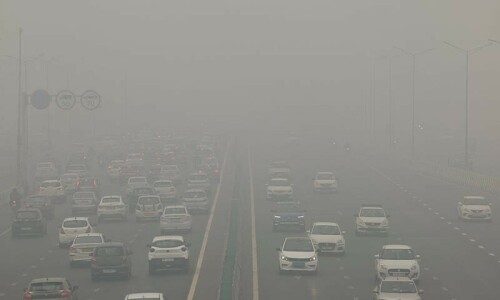TEHRAN, Feb 19: Pakistan and Iran have signed an agreement to enhance cooperation in security matters and combat trans-national organised crime.
At the signing ceremony, Interior Minister Rehman Malik and his Iranian counterpart Mustafa Najar said providing internal security would be conducive to trade and crime control.
Under the agreement, Mr Malik said, both countries would cooperate in preventing and combating organised crime, including smuggling of goods, especially cultural and historical objects, and the restitution of such times.
They will also collaborate to curb forgery of state securities, travel documents, currency notes and credit cards, money laundering, use of income from such activities and illicit trade in weapons, ammunition and explosive materials.
Other areas of cooperation include terrorism, activities posing a threat to national security of either country, human trafficking, illegal immigration and abuse of women and children during the process, cyber crime and crimes committed through misuse of communication and telecommunication devices.
In reply to a question about methods of cooperation, Mr Malik said measures to be taken by each country to implement the agreement would include identifying groups or persons involved in trans-national organised crime and providing relevant information such as photographs and fingerprints (of criminals) to the other country.
He said both countries would also exchange information on different types of trans-national organised crime, preventive methods, laws on crime prevention and measures taken to strengthen the management of the borders, like equipping the border stations.
They would share information and experiences on new types of narcotics, psychotropic substances, basic and chemical substances and the routes used for drug trafficking, besides their experiences in organising and training their forces, the minister said.
He said they had agreed to establish a joint working group, headed by the deputy interior minister of Iran for security and the home secretary of Pakistan, to monitor implementation of the agreement, offer solutions of problems faced during the course of the implementation and review and update this agreement, if and when required.
Mr Najar said the agreement would help expand bilateral ties. He expressed sympathy with the people of Pakistan over the Quetta bomb blast, saying both countries stood together against terrorism and would eliminate the menace to ensure peace in the region.
Rehman meets Iranian president Mr Malik held a meeting with the President of Iran, Mahmoud Ahmadinejad, and discussed with him matters of bilateral interest.
Taking to reporters after the meeting, Mr Malik said the Iranian president had agreed to set up two more check-posts at his country’s border with Pakistan to curb smuggling and enhance bilateral trade. Officials from both sides will meet in the first week of March to finalise the modalities.
He said Mr Ahmadinejad had expressed sympathy over the Quetta tragedy and said joint effort would help both countries to eliminate the menace of terrorism and extremism. —APP














































Dear visitor, the comments section is undergoing an overhaul and will return soon.